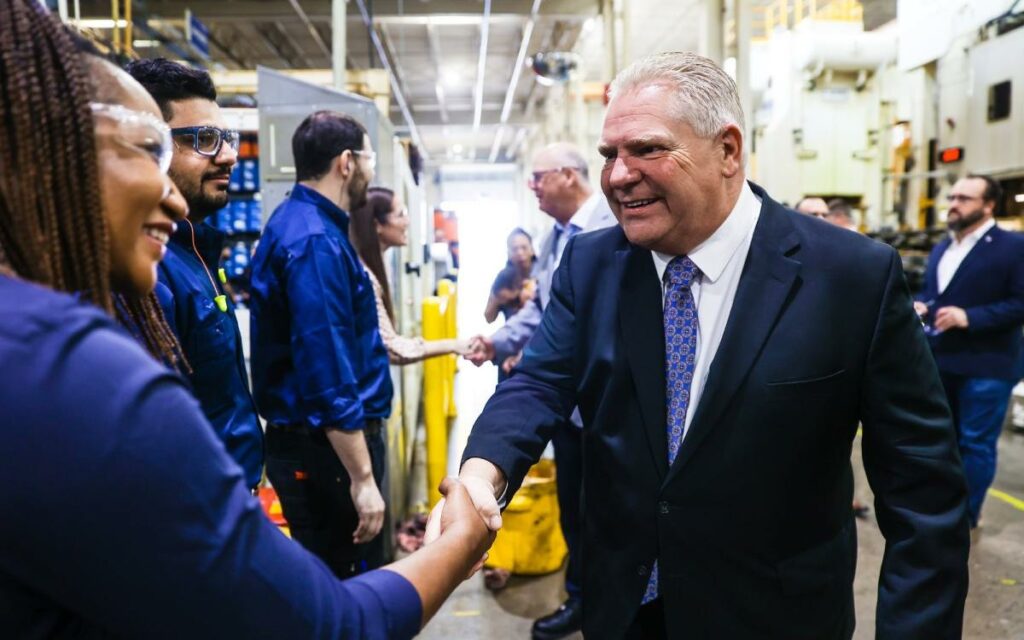
Thanks in large part to inflation, provincial government set to collect nearly $25 billion more in tax revenue this year versus last. If he’s truly a man of and for the people, the premier would share some of that windfall with the wider population by lowering Ontario’s sales tax. Photo credit: Twitter/Doug Ford
It’s time for Ontario Premier Doug Ford to put sales taxes on the chopping block.
This year, the Ford government is bringing in a whopping $24.6 billion more in tax revenue than the government did last year.
That’s right: $24.6 billion.
Despite that huge cash windfall, Ford is refusing to deliver sorely needed relief for Ontario families.
Yes, the Ford government has cut the gas tax temporarily and removed license plate sticker renewal fees. Those two moves leave roughly $2 billion more in taxpayers’ wallets. But that’s less than 10 per cent of all of the new revenue Queen’s Park is bringing in.
Ontario’s politicians are rolling in the dough because of inflation. When prices are higher, so too is sales tax revenue. You get squeezed at the gas pump and at the hardware store, but the Ford government is enjoying a massive tax windfall.
With Ontario on the cusp of balancing the books, which is due entirely to increased tax revenue and has nothing to do with government spending restraint, it’s time for the Ford government to look at serious relief. The government is projecting a surplus of $2.2 billion in 2024-25 and $8.4 billion in 2025-26.
Here’s a bold idea: Ford should cut the sales tax.
As Ontarians continue to deal with higher prices everywhere, the Ford government could help lower bills nearly everywhere taxpayers shop by slashing the HST.
Alberta doesn’t have a sales tax. British Columbia, Saskatchewan and Manitoba have provincial sales taxes that are lower than Ontario’s. It’s time for Canada’s largest province to play a little catch up.
How would lowering the sales tax impact government coffers? Based on budget data from earlier this year, lowering the HST by two percentage points would save taxpayers up to $8.8 billion.
Given that the province has seen revenue growth of about three times that amount, delivering sales tax relief is more than reasonable. And to pad the budget even further, Ford could save $15.5 billion just by returning to last year’s spending levels.
Consider the impact such relief could have on Ontario families.
A household in Ontario bringing in a total income of $100,000 a year, which is right on pace with the provincial average, currently pays $3,270 in provincial sales tax. Cut that sales tax rate from eight per cent to six per cent, and that family stands to save around $800 a year.
Ontario families are struggling to pay the bills. Last year, inflation hit harder than it has in decades. Sales tax relief could make a meaningful difference in allowing families to make ends meet.
There are lots of ways for the province to save money and give taxpayers a break. The Ontario government seems to have no problem throwing taxpayer cash at Fortune 500 corporations. In recent years Ford has handed hundreds of millions of dollars to Volkswagen, the Ford Motor Company and Chrysler parent company Stellantis, just to name a few. It’s time to blow a little less money on big multi-national corporations and give taxpayers a hand.
Many Ontario households are stretched to the max. The average Canadian owes over $21,000 in non-mortgage debt. It’s time for the government to put the interests of taxpayers first instead of wealthy Fortune 500 corporations.
With Ontario’s fiscal outlook looking rosy, Finance Minister Peter Bethlenfalvy should give a serious look at sales tax relief ahead of his fiscal update in the early fall. The government is positioned well to deliver on lower sales taxes and taxpayers need relief now more than ever.
Ford has long sold himself as a man of the people. If Ford truly is in tune with the average Ontario family, tax relief should be his top priority.

Jay Goldberg is the Ontario Director at the Canadian Taxpayers Federation. He previously served as a policy fellow at the Munk School of Public Policy and Global Affairs. Jay holds a Ph.D. in Political Science from the University of Toronto.






